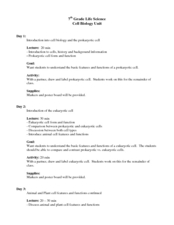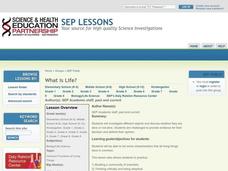Curated OER
What Does Life Look Like Under a Microscope?
Young scholars discover cells make up all living things. In this life science instructional activity, students investigate living organisms and the cells that create them. Finally the young scholars create a testable question, conduct an...
Curated OER
Coloring the Life Cycle of Fruits and Vegetables
Students investigate how fruits and vegetables change and grow. In this life cycle of fruits and vegetables lesson, students observe the changes in fruits and vegetables as they grow and record the colors on a worksheet.
Curated OER
Oceans in Motion
This simple lesson introduces children to basic marine life as well as to show them the necessity of protecting aquatic environments. Some famous marine life animals are introduced via vocabulary words, then children cut out pictures of...
Curated OER
Cell (Biology)
Students conduct a series of activities to explore the nature of cells. In this biology lesson, students observe plant and animal cells under the microscope and compare them. They differentiate osmosis and diffusion.
Curated OER
Life Cycle - Human Biology
For this life cycle worksheet, 9th graders complete 3 different procedures that distinguish viruses and bacteria and inherited characteristics. First, they read the background excerpt given about bacteria and viruses. Then, students cut...
American Society for Microbiology
”Build a Bacterium” Scavenger Hunt
An exciting activity has scholars use cell parts to build bacteria through cooperation with other groups. Each group has some of the cell parts needed, but they must trade with other groups to be able to fulfill their function as a...
Curated OER
Cells Are Us
Students explore cells. In this science lesson plan, students investigate how the cell is the basic unit of life, that cells divide slowly to become mass of cells, and that there is a gradual loss of cells throughout life.
Curated OER
What is Life?
Students investigate the characteristics of living things. In this life science instructional activity, students examine several living and non-living specimens. Students determine which things are living and non-living.
Curated OER
Invertebrate Vocabulary-- Marine Invertebrate Match
In this science worksheet, students study 12 vocabulary words which pertain to marine invertebrates. Students read the definitions which include pronunciation, part of speech and meaning of the name. Students then look at 16 organisms...
University of Minnesota
What's the Deal? Addiction Card Game
Addiction is a big deal! Playing a game of cards helps learners understand the concept of addiction. Through their analysis, they examine the potential for addiction and how it varies for each individual.
Curated OER
Cell Energy-Colorful Respiration
Students examine the acid-base indicator, bromthymol blue (BTB), and what happens to it when you blow air into it or add plants and snails. Through an experiment, they test three different setups of BTB and record the color changes that...
Community Resources for Science
A Whole New World of DNA and Proteins
Lead your young scientists into an exciting world as they participate in a role play and experiment focused on proteins and DNA. After researching the Central Dogma of Biology, individuals or groups participate in a classroom slide...
Global Oneness Project
The Value of Ancient Traditions
Imagine having to give up cell phones, computers, and TV? What would be lost? What gained? An examination of the Drokpa, a nomadic people who live in the grasslands of Tibet, provides class members an opportunity to consider how access...
Curated OER
Collecting Plankton
In this science worksheet, students learn facts about plankton by reading two pages of factual information. Students read about the different kinds of plankton and how it is classified. Detailed drawings are included. There are no...
Curated OER
Applied Science - Science and Math Lab (read without sight)
Students consider the senses. For this sight and touch lesson, students discover what it is like to function like a person who is blind. They work in groups and individually on various activities to experience this condition. This lesson...
Curated OER
What is Biotechnology?
Young consumers explore the concept of biotechnology as it pertains to the foods they eat, economics, and agriculture. They watch several videos, explore a website, complete worksheets, and engage in class discussion. Son they'll know...
Curated OER
Fungus
Students study fungus, its reproduction and uses. In this eukaryote lesson students complete several fungal experiments.
Curated OER
H2O in Us
Students discover through this activity that all organisms are composed of water. They find that 70 percent of their bodies are made up of water that is in thier cells and blood, and not free-flowing throughout their body.
Teach Engineering
The Keepers of the Gate Challenge
Help your class make a connection between salt water and nanoscience. In the introductory lesson of a seven-part unit, the class explores why salt water helps a sore throat feel better. Pupils conduct preliminary research about the...
Curated OER
Characteristics of Snakes and Turtles
Students examine the characteristics of snakes and turtles and compare/contrast reptiles with mammals. They watch a video, answer discussion questions, complete information charts, conduct Internet research, and create a habitat diorama.
Curated OER
Photosynthesis in a Jar
Students simulate Joseph Priestley's experiments using a bell jar. They demonstrate that oxygen is necessary for fire and animals but that given time, plants can create oxygen, allowing fires to burn and animals to breathe.
Curated OER
It's Okay to Exhale: Photosynthesis and Cellular Respiration
Learners will observe the differences between photosynthesis and cellular respiration. Then they observe the links due to climate changes and relate how climate change affects their lives.
Curated OER
How Does a Green Plant Grow?
Students of all ages can explore the question "how do seeds grow?", design an experiment to answer the question, predict the outcome of the experiment then conduct the experiment.
Curated OER
Building a Circulation City
Young scholars identify the different organ systems found throughout the human body. Using a model, they explain and draw the flow of blood and name the parts of the circulatory system. They create their own circulation city in which...

























